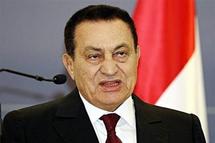
- Egyptian President Hosni Mubarak
Mubarak's speech was aired to commemorate the 1952 revolution that overthrew the country's monarchy.
"Economic growth and social justice summarise the many goals we aim for today, tomorrow and after tomorrow," Mubarak, who appeared in good health, said in the address broadcast by state television.
The veteran ruler, president since 1981 after the assassination of Anwar Sadat, has not said whether he intends to stand in the next election in 2011.
His government was forced to respond to reports in Arab and Israel media that his health was in rapid decline after he pushed back the meetings with Israeli Prime Minister Benjamin Netanyahu.
He eventually met Netenyahu, Palestinian president Mahmud Abbas and a US envoy on Sunday and attended four military and police graduation ceremonies over the week.
Mubarak allowed for the first multi-candidate presidential election in 2005, but constitutional hurdles and decades of rigid rule by the National Democratic Party make it likely that his successor will be decided by a backroom deal.
He never appointed a vice president, the stepping stone to the presidency over the past six decades, which saw just four presidents-- the first serving under a year before he was forced out by his successor Gamal Abdel Nasser, who died in office.
Mubarak took over after president Sadat was gunned down by an assassin. His son Gamal, a 46-year-old former investment banker with a senior party position, is widely seen as the heir apparent.
-----------------------------------------------------------------------------
"Economic growth and social justice summarise the many goals we aim for today, tomorrow and after tomorrow," Mubarak, who appeared in good health, said in the address broadcast by state television.
The veteran ruler, president since 1981 after the assassination of Anwar Sadat, has not said whether he intends to stand in the next election in 2011.
His government was forced to respond to reports in Arab and Israel media that his health was in rapid decline after he pushed back the meetings with Israeli Prime Minister Benjamin Netanyahu.
He eventually met Netenyahu, Palestinian president Mahmud Abbas and a US envoy on Sunday and attended four military and police graduation ceremonies over the week.
Mubarak allowed for the first multi-candidate presidential election in 2005, but constitutional hurdles and decades of rigid rule by the National Democratic Party make it likely that his successor will be decided by a backroom deal.
He never appointed a vice president, the stepping stone to the presidency over the past six decades, which saw just four presidents-- the first serving under a year before he was forced out by his successor Gamal Abdel Nasser, who died in office.
Mubarak took over after president Sadat was gunned down by an assassin. His son Gamal, a 46-year-old former investment banker with a senior party position, is widely seen as the heir apparent.
-----------------------------------------------------------------------------









 Home
Home Politics
Politics









